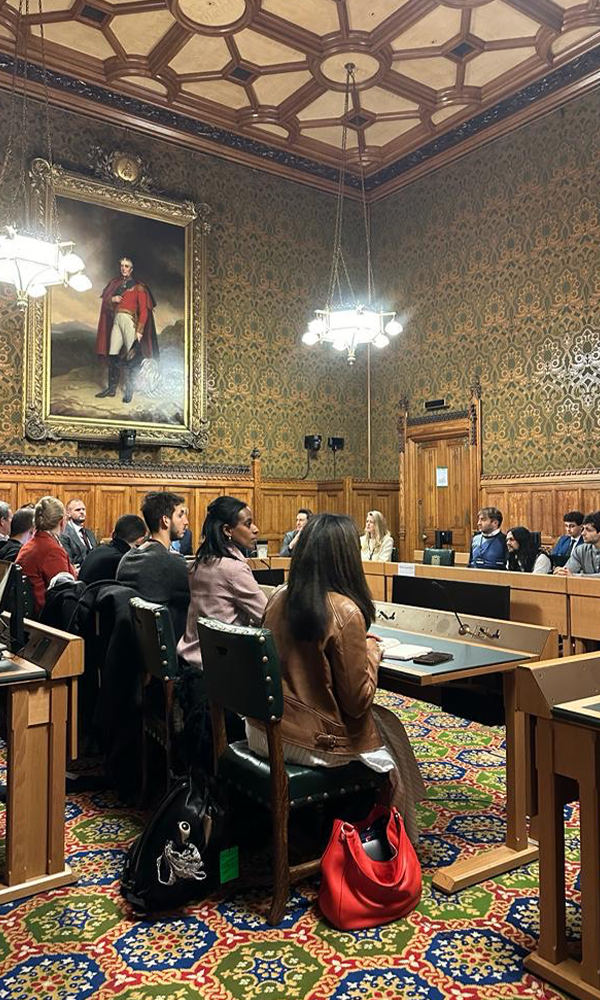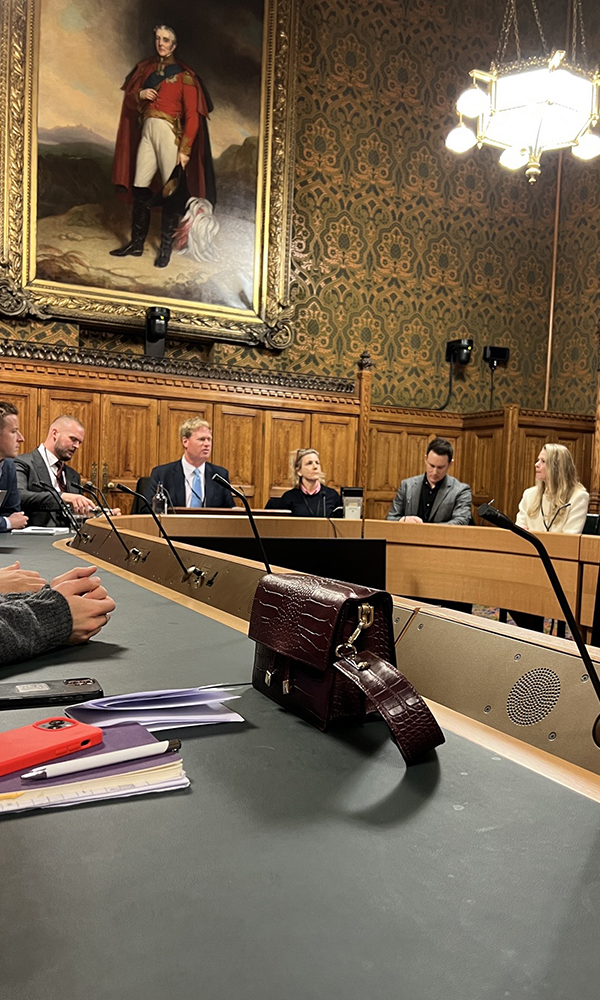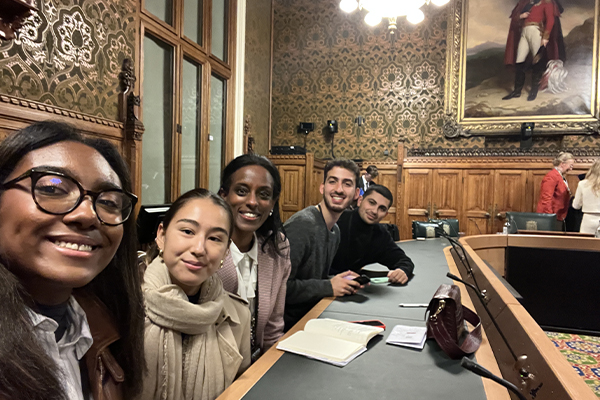The modern workplace is evolving at a lightning pace, propelled by the unstoppable force of digital transformation. In this dynamic landscape, the burning question echoes: What does the future hold for digital skills to navigate this whirlwind of change?
While Gen Z is naturally equipped with digital prowess, the challenge lies in harnessing these skills to shine amidst a sea of talent.
Imagine stepping into the future through the eyes of two of our talents, Patricia Jade Abena Acquah and Sofia Hsu, representatives of the Istituto Marangoni London Fashion Business BA programme, who were invited to the Digital Skills Summit at the Houses of Parliament, accompanied by our Fashion Business Programme Leader, Sennait Ghebreab.
Hosted by the Parliament Street think tank, the Digital Skills Summit provided a stage for thought-provoking discussions with industry experts, offering invaluable insights into the ever-evolving digital landscape. Tech leaders gathered to address the urgency of bridging Britain’s digital skills gap and explore potential solutions. Key takeaways from the summit underscored the potential hindrance of a shortage of tech talent on innovation for UK tech companies and emphasised the importance of tackling the digital skills challenge to nurture innovation and progress in the tech industry. The event aimed to offer a platform for learning, networking, and sharing best practices in the digital world.

Istituto Marangoni London representatives accompanied by Sennait Ghebreab (Fashion Business Programme Leader) during the Digital Skills Summit at the Houses of Parliament
Of course, it was a tremendous opportunity. It’s not every day that students find themselves stepping into the Palace of Westminster, the revered seat of the United Kingdom’s Parliament, and participating in discussions about their professional futures. As we experienced it first-hand, we couldn’t wait to share our insights.
So, do you believe your digital skills are competitive enough for the Fashion Industry? Let’s uncover the secret to staying relevant in a digitally charged world.
Navigating the Path to Digital Progression: Unveiling Strategies for Skill Acquisition
“As a student pursuing a course in Fashion Business, Digital Communication & Media,” stated Sofia, “this event served as an informative and educational experience, providing insights into the broader context of digital commerce and its transformative impact on various industries, including fashion.”
The Skills Summit, chaired by Dean Russell, MP for Watford, and Steven George-Hilley, Founder of Centropy PR, focused on central themes such as digital skills development, policy implications, training methodologies, and coding skills, all of which are increasingly relevant across various sectors of work. For our students, it was an opportunity to gain practical experience and showcase their interests and potential.
“We are all expected to be more digitally progressive, but how do we learn these skills?” questioned Patricia at the panel.

Hosted by the Parliament Street think tank, the Digital Skills Summit provided a stage for thought-provoking discussions with industry experts
The summit focused on the challenges and opportunities of skills development, delving into the ever-evolving work environment with the integration of generative AI technology, and highlighting the importance of equipping individuals of all ages with new skills.
Sofia pointed out, “The summit brought attention to the need for continuous learning and upskilling to address skill gaps across age groups.”
Patricia reported, “It’s not the lack of resources, but rather the fear of failure that prevents the older generation from adapting.” She underscored the core of the problem and suggested a potential path forward: “Creating an environment that is more accepting and shifting the dialogue around the subject could benefit all age groups in the UK workforce.”
Educators: The Cornerstone Influencers for the Emerging Technological Workforce
During the panel discussion, Sennait Ghebreab, Programme Leader of the Fashion Business courses at Istituto Marangoni London, posed a critical question about how educators can effectively equip students with the necessary digital skills to remain competitive in the post-study environment. Sofia elaborated, explaining that the topic arose “when one attendee mentioned the lack of motivation from younger generations.”
In response, panellists highlighted educators’ vital role in inspiring students to adopt an explorative spirit “to bridge theoretical concepts we have learned from the classroom into real-world situations,” as Sofia recalled. However, as Patricia pointed out, “While it is important to include topics such as AI in the course material, students need to have an independent interest in knowing more.”

Digital Skills Summit at the Houses of Parliament
Striking a Balance: Thriving in the AI World while Preserving Soft Skills
“How can young individuals, much like myself,” Patricia shared, “seamlessly integrate into the workforce by balancing conventional and cutting-edge skills?” Reporting from the panellists, she added, “Gen Z often needs to bolster their confidence in their skills and capabilities. The initial step isn’t necessarily to excel in applications but to simply start applying.
She further explained, “My generation has proven to be highly resilient, with many of us experiencing crucial points of growth during the pandemic years. We learned to adapt to rapid change and made the most of life during times of great uncertainty.” Emphasising the generational value of finding life balance, she continued, “Gen Z has been observed to take risks, and many panel members echoed that while we are young, it is the best time to take risks.” Patricia concluded with a callout, “We should remember that ambition is one of the most valuable elements we can possess.”
Reflecting on the summit, Patricia shared what she learned from the panellists, stating, “We need to identify our unique differentiating factors, a niche that suits ourselves. Then, we should learn how to effectively communicate our adaptive skills and bring a competitive edge to employers, or even take it a step further to become irreplaceable in the workforce.”
Entering the Digital Era: Fashion Business Perspectives
Sofia framed the discussion in her study. “The intersection of fashion, business, and digital media is paramount, with social media marketing and e-commerce becoming intertwined,” she said. “The increasing reliance on AI for data analysis, trend forecasting, and personalised customer experiences is transforming the way fashion businesses operate,” she added, emphasising how important it is for fashion students to embrace these technological changes.
She continued by stating that for professionals in the fashion sector, “it is not only a matter of implementing traditional business and communication strategies but also of possessing an understanding of digital platforms, coding languages, and emerging technologies.”
Standing Out: Strategies for Young Talent in Today’s Competitive Landscape
Encouraging her classmates, Patricia said, “As students, we must nurture a spirit of exploration, looking for opportunities in places we may not expect.”
She then provided some statistics from a business perspective, stating, “The government estimates that the Digital Strategy could grow the UK tech sector’s annual gross value added (GVA) by an additional £41.5 billion by 2025 and create a further 678,000 jobs.” She added, “So, there are ways to equip ourselves to expand our digital workspace.”
The action she proposed is to delve into media and courses related to AI digital efficiencies and to reconsider some traditional soft skills “because, in a digital world, the human touch has never been more valuable.”

Istituto Marangoni London representatives with Sennait Ghebreab (Fashion Business Programme Leader) during the Digital Skills Summit at the Houses of Parliament
The students left the summit with a comprehensive set of skills. “It was truly remarkable,” concluded Sofia. “The experience was not only informative and educational but also helped me envision the ever-evolving professional world and the role students can play in shaping the future of the fashion industry.”
Patricia added, “A special thanks to Rebeca Riofrio, Director and Chairman of the UK Parliamentary Society for Arts, Fashion & Sports, for inviting our Programme Leader, Sennait Ghebreab, who generously extended the invitation to student representatives.”
Silvia De Vecchi
University Librarian, London



